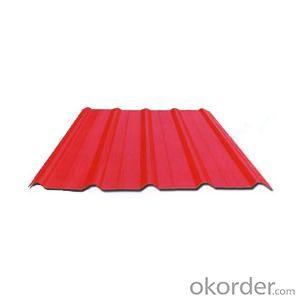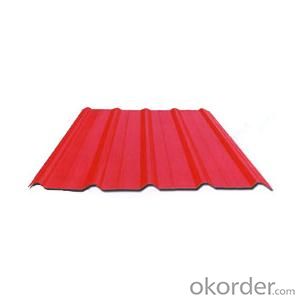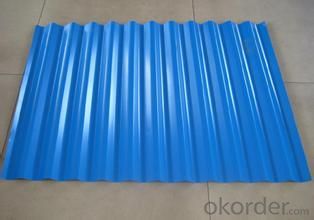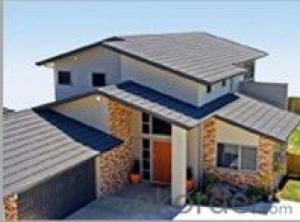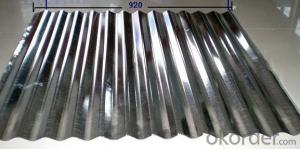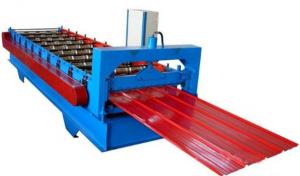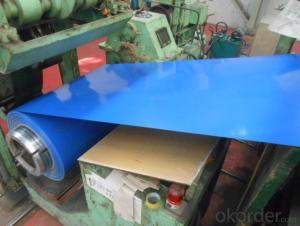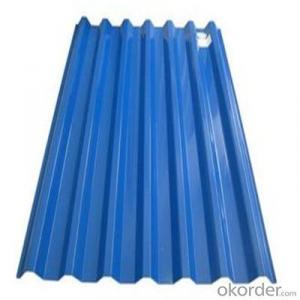Prepainted gavanized steel sheet
- Loading Port:
- China Main Port
- Payment Terms:
- TT OR LC
- Min Order Qty:
- -
- Supply Capability:
- -
OKorder Service Pledge
Quality Product, Order Online Tracking, Timely Delivery
OKorder Financial Service
Credit Rating, Credit Services, Credit Purchasing
You Might Also Like
Packaging & Delivery
| Packaging Detail: | standard seaworthy export packing ( ppgi steel sheet ) |
| Delivery Detail: | 5-15 days |
Specifications
Specifications: corrugated roofing sheets
1.Delivery shortly
2.Lowest price to Quality product
3.Flexible expert service
- Q: Can the steel sheets be used in harsh environments?
- Yes, steel sheets can be used in harsh environments. Steel is a strong and durable material that can withstand extreme temperatures, heavy loads, and exposure to moisture, chemicals, and other harsh conditions. Steel sheets are commonly used in industries such as construction, automotive, aerospace, and marine where they are exposed to harsh environments like high heat, corrosive substances, and heavy wear and tear. Additionally, steel can be coated or treated with protective materials to enhance its resistance to harsh environments, ensuring long-lasting performance and reliability.
- Q: Can steel sheets be used for manufacturing medical devices?
- Yes, steel sheets can be used for manufacturing certain medical devices. Steel is a durable and strong material that can provide the necessary strength and stability required for certain medical devices. However, it is important to note that the suitability of steel sheets for specific medical devices would depend on the intended use, design requirements, and regulatory guidelines.
- Q: How are steel sheets inspected for defects?
- To ensure the quality and reliability of steel sheets, various techniques and methods are utilized for defect inspection. One such method involves trained inspectors conducting visual inspections, carefully examining the surface of the steel sheet for visible defects such as cracks, scratches, dents, or irregularities. This examination takes place under appropriate lighting conditions to optimize visibility. Another technique employed is magnetic particle inspection, primarily used for detecting surface or near-surface defects in ferromagnetic materials like steel. By applying a magnetic field to the steel sheet and subsequently introducing iron particles onto the surface, any defects present will attract these particles, forming visible indications. This allows inspectors to pinpoint the location and size of the defect. Ultrasonic inspection, on the other hand, utilizes high-frequency sound waves to identify internal defects within steel sheets. By passing ultrasonic waves through the material and utilizing sensors to detect any alterations in wave patterns caused by defects, this non-destructive testing method can identify imperfections such as voids, cracks, or inclusions that may not be discernible to the naked eye. Additional techniques employed for defect detection in steel sheets include eddy current testing, where electrical currents are induced in the material to identify surface defects, and X-ray inspection, which employs high-energy X-rays to reveal any internal flaws. In summary, a combination of visual inspection and non-destructive testing methods is utilized to conduct thorough defect inspections on steel sheets. This ensures that only high-quality sheets are utilized in various industries, including construction, automotive, and manufacturing.
- Q: How thick are steel sheets available?
- Steel sheets are available in various thicknesses, ranging from as thin as 0.4 millimeters to as thick as 150 millimeters, depending on the specific application and requirements.
- Q: What are the uses of steel sheets?
- Steel sheets have a wide range of uses in various industries such as construction, automotive, manufacturing, and aerospace. They are commonly used for building structures, roofing, walls, and foundations due to their strength and durability. Steel sheets are also utilized in the production of automobiles, appliances, machinery, and equipment as they provide a strong and lightweight material. Additionally, they are used for fabricating containers, storage tanks, and pipelines due to their resistance to corrosion.
- Q: What are the different types of steel sheet surface coatings for corrosion resistance?
- There are several types of steel sheet surface coatings available for corrosion resistance, including galvanized coatings, zinc-rich coatings, aluminum coatings, and organic coatings such as paint or epoxy. Each coating offers unique benefits and application suitability depending on the specific requirements and environmental conditions.
- Q: How do steel sheets perform in terms of abrasion resistance?
- Steel sheets generally offer excellent abrasion resistance due to their hardness and durability. They are often used in applications where resistance to wear and tear is crucial, such as in construction, manufacturing, and automotive industries.
- Q: What are the different grades of steel used for sheets?
- The different grades of steel used for sheets vary depending on the intended application and required properties. Some common grades include low carbon steel (C1008 or C1010) for general purpose applications, medium carbon steel (C1045) for higher strength and hardness, and high carbon steel (C1095) for applications requiring extreme strength and wear resistance. Stainless steel grades such as 304 and 316 are also commonly used for their corrosion resistance in various industries.
- Q: What is the difference between a hot rolled and pickled steel sheet?
- A hot rolled steel sheet is made by rolling a heated slab of steel through a series of large rollers, resulting in a thick and rough surface finish. On the other hand, a pickled steel sheet undergoes an additional process called pickling, where the surface of the hot rolled steel is treated with an acid solution to remove impurities and create a smooth and clean surface finish. So, the main difference between the two is the surface finish - hot rolled steel has a rougher surface, while pickled steel has a smoother and cleaner surface.
- Q: Are steel sheets suitable for magnetic shielding applications?
- Yes, steel sheets are suitable for magnetic shielding applications.
Send your message to us
Prepainted gavanized steel sheet
- Loading Port:
- China Main Port
- Payment Terms:
- TT OR LC
- Min Order Qty:
- -
- Supply Capability:
- -
OKorder Service Pledge
Quality Product, Order Online Tracking, Timely Delivery
OKorder Financial Service
Credit Rating, Credit Services, Credit Purchasing
Similar products
Hot products
Hot Searches
Related keywords
